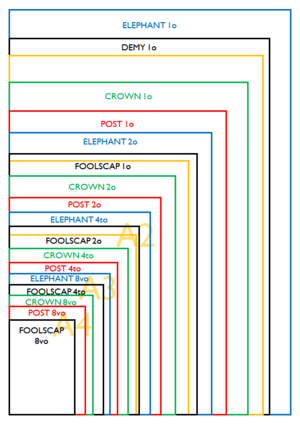Nortish scrivenry
Scrivenry forms an important part of the Erbonian domestic industry. The Compagnie of Scriveners is a powerful national guild which controls the sale of scrivenry as well as the printing, engrossing and illumination trades. Scrivenry includes all paper, parchment, ink and stationery productions used for printing, engrossing, illumination and writing purposes.
Paper sizes
The sizes in which paper is sold or used in trade and commerce are prescribed by the Compagnie of Scriveners, which standardised the paper sizes in use in 1855. Paper sizes are named by reference to „base”, or „plano” paper sizes. The terms „folio”, „quarto”, „octavo”, „sextodecimo” and so on are used to refer to halved, quartered and eighthed sizes of the base paper size. These are abbreviated „2o”, „4to”, „8vo”, „16mo” and so on. Larger sizes may be named using the terms „double”, „fourfold” and „eightfold” (and so on) for doubled, quadrupled and octupled paper sizes; however, it is more common to refer to these larger sizes by unique names.
| Size | Inches | Centimetres | Ratio | Name | ||
|---|---|---|---|---|---|---|
| FOOLSCAP SERIES | ||||||
| Eight | 36 | 52 | 86.11 | 124.38 | 1.44 | Double Soleil |
| Four | 26 | 36 | 62.19 | 86.11 | 1.38 | Soleil |
| Double | 18 | 26 | 43.06 | 62.19 | 1.44 | Demy |
| Plano | 13 | 18 | 31.10 | 43.06 | 1.38 | Foolscap |
| Folio | 9 | 13 | 21.53 | 31.10 | 1.44 | Foolscap Folio |
| Quarto | 6½ | 9 | 15.55 | 21.53 | 1.38 | Foolscap Quarto |
| Octavo | 4½ | 6½ | 10.76 | 15.55 | 1.44 | Small Card |
| POST SERIES | ||||||
| Eight | 42 | 60 | 100.46 | 143.52 | 1.43 | Double Imperial |
| Four | 30 | 42 | 71.76 | 100.46 | 1.40 | Imperial |
| Double | 21 | 30 | 50.23 | 71.76 | 1.43 | Medium |
| Plano | 15 | 21 | 35.88 | 50.23 | 1.40 | Post |
| Folio | 10½ | 15 | 25.12 | 35.88 | 1.43 | Post Folio |
| Quarto | 7½ | 10½ | 17.94 | 25.12 | 1.40 | Post Quarto |
| Octavo | 5¼ | 7½ | 12.56 | 17.94 | 1.43 | Large Card |
| CROWN SERIES | ||||||
| Eight | 46 | 66 | 110.03 | 157.87 | 1.43 | Double Atlas |
| Four | 33 | 46 | 78.94 | 110.03 | 1.39 | Atlas |
| Double | 23 | 33 | 55.02 | 78.94 | 1.43 | Copydraught |
| Plano | 16½ | 23 | 39.47 | 55.02 | 1.39 | Crown |
| Folio | 11½ | 16½ | 27.51 | 39.47 | 1.43 | Crown Folio |
| Quarto | 8¼ | 11½ | 19.73 | 27.51 | 1.39 | Crown Quarto |
| Octavo | 5¾ | 8¼ | 13.75 | 19.73 | 1.43 | Crown Octavo |
| ELEPHANT SERIES | ||||||
| Eight | 56 | 78 | 133.95 | 186.58 | 1.39 | Double Hartroyal |
| Four | 39 | 56 | 93.29 | 133.95 | 1.44 | Hartroyal |
| Double | 28 | 39 | 66.98 | 93.29 | 1.39 | Crossmarten |
| Plano | 19¼ | 28 | 46.64 | 66.98 | 1.44 | Elephant |
| Folio | 14 | 19½ | 33.49 | 46.64 | 1.39 | Elephant Folio |
| Quarto | 9¾ | 14 | 23.32 | 33.49 | 1.44 | Elephant Quarto |
| Octavo | 7 | 9¾ | 16.74 | 23.32 | 1.39 | Elephant Octavo |
Paper in the four common series of foolscap, post, crown and elephant paper are commonly available at scriveners around the country. Foolscap paper, especially foolscap folio and quarto, is the typical personal writing paper series. It is quite similar to the international A-series, being only slightly larger than corresponding A-series sizes. For example, foolscap folio is slightly taller and wider than A4 paper. Post paper, also known as brief, is commonly used for legal or office documents. For instance, business letters are commonly written on post quarto paper, while deeds and contracts are typically written on post folio sized sheets (hence the practice of charging per folium. Many books are printed on crown sized paper and folded into quartos or octavos, although it is commonly also used by artists, draughtsmen and the like. Elephant paper is mostly used for newspapers, where a broadsheet is an elephant sheet folded once into a folio (hence the name, „elephant folio”), and a halfsheet folded twice into quartos. Elephant paper unfolded is commonly used for posters and bills.
Mourning scrivenry
Mourning scrivenry is available and commonly used during periods of mourning, or to shew grief or sorrow at the death of a person. The distinctive feature is the black border which is applied to cards, paper and envelopes, in addition to the customary use of only black ink. If special stationery is not available, it is usual to draw a black line around the border of the piece of paper to indicate mourning. The use of mourning scrivenry is tied to the wearing of mourning dress, and generally ceases when one leaves full mourning. However, it is also used when the subject of the document relates to the death, or when one is sending letters or cards to the bereaved.
This page is written in Erbonian English, which has its own spelling conventions (colour, travelled, centre, realise, instal, sobre, shew, artefact), and some terms that are used in it may be different or absent from other varieties of English. |

